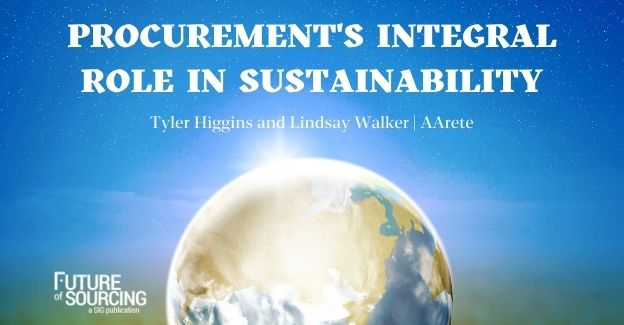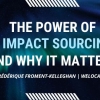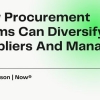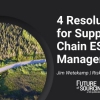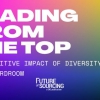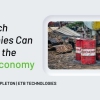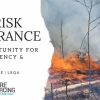Procurement is the gatekeeper when it comes to meeting your organization’s sustainability mission, say AArete's Tyler Higgins and Lindsay Walker. They offer four impactful ways that your procurement organization can support sustainability and create symbiotic partnerships with your suppliers.
With floods, fires and failing supply chains increasing throughout 2021, we welcome another crisis to the center stage: climate change. The impacts of these disastrous events rippled across every industry and were felt by both consumers and suppliers, causing a major shift in how we do business.
It is not merely a question of if something can be manufactured or sourced, but it has become a question of how. Procurement plays a vital role in being the gatekeeper to procuring products and services without unnecessary depletion of natural resources!
The theme for 2022 will continue to be tackling sustainable projects and aligning corporate goals with those of society today. The first consideration for most organizations is greenhouse gas emissions and its environmental impact – justifiable, procurement may not see its role in impacting this, but it very much has a hand in preventing emissions.
How Procurement Can Help Meet Your Organization’s Sustainability Mission
Whether procurement organizations view themselves this way or not, they are the first gatekeeper to ensure the company’s sustainability mission statement is fulfilled. For example, there has been a large shift over the past decade in the way packaging materials are being sourced.
Plastic materials generally pose the cheapest option for a lot of reasons – low cost to manufacture and easy to mass produce – making them attractive to a procurement professional trying to achieve savings. However, companies can no longer defend the amount of waste generated by utilizing single use materials!
When considering the environmental impacts that small parcel packaging materials have on a booming eCommerce and digital culture, retailers have drastically shifted their strategy to recyclable materials. The amazing part of where we are in our society is that these changes can enhance brand loyalty and customer support.
Vendor Partnerships – A Symbiotic Relationship
While packaging is one prominent example, the most common area for emissions and waste is manufacturing. This assessment goes back to how something is produced and at what cost to the environment.
With the EPA and other regulatory agencies continuing to expand their watch over carbon footprints, organizations will have to find a cleaner way to do business. Public statements from CEOs and leaders across clients and industry have exhibited a growing focus on renewable energy and commitments to achieve carbon neutral status in the coming decades.
Procurement organizations can play a critical role here by partnering with vendors that are committed to becoming energy efficient, whether through solar power, wind power or recycling energy. Strategic evaluation of vendor partnerships offers an opportunity for a mutually beneficial relationship helping each party achieve more sustainable operations.
As procurement sources goods and services from suppliers leveraging renewable energy sources and clean manufacturing practices, they are growing revenue for the supplier. The supplier can then increase their own investments into additional energy-efficient efforts.
This symbiotic relationship can be key to growing a sustainability presence. Instead of just one company pushing a sustainable agenda, you now have two.
A Roadmap to Sustainability
Like your manufacturing partners and your manufacturing process, procurement can enhance sustainability at an organization through sourcing renewable energy and supporting sustainable initiatives in facilities and reusable materials directly.
Procurement organizations can establish robust, sustainable procurement policies in the following ways:
- Ensure all goods are backed by a sustainable business certification such as EPA Safer Choice, EcoLogo, EPEAT, Energy Star or PEFC
- Invest in data and analytics to monitor inefficiencies and energy waste
- Establish set points at locations that allow for comfortable work conditions, but also minimize energy usage
- Launch focused sustainability efforts in indirect procurement categories such as paper, janitorial supplies, cleaning supplies, ink/toner, appliances and furniture
- Lighting initiatives focused on energy efficient lighting, especially for facilities that operate 24/7
- Identify areas of sustainable improvements around construction materials and architectural design for new builds and renovations (e.g., LEED-certified buildings)
- Prioritize purchase of multiple use products before purchasing recyclable or compostable products
There is no question that the world is changing, and it is changing fast. Between the race for the most successful electric car or the increasing cost of consumption, it is clear sustainability will only become more of a focus.
Almost every 2022 company announcement includes a commitment to more sustainable practices. Procurement can be a key leader in realizing these goals while driving long-term savings for their organization.
As you reflect on your own commitment sustainability, consider addressing these four impactful ways that your procurement organization can support sustainability:
- Partner with vendors based on a strategic evaluation of their sustainability practices
- Source renewable energy (e.g., solar) and look for ways to offset carbon emissions through renewable energy investments
- Leverage opportunities to purchase reusable materials without sacrificing quality
- Avoid bulk buying habits of perishable products and/or products that will go unused to achieve marginal volume discounts


